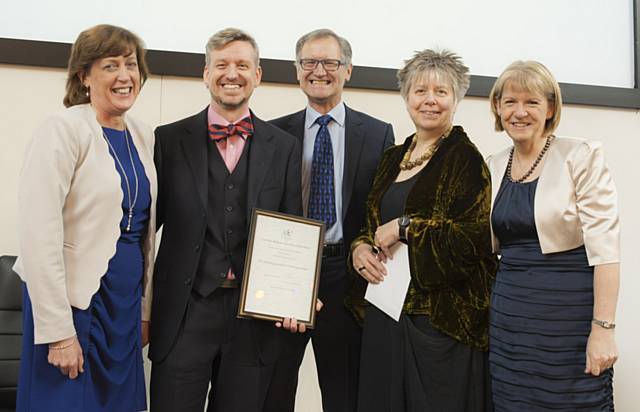Therapist wins national award
Date published: 29 November 2012

Dr. Sean Pert (second from left) accepts the award with Carol Stow (fourth from left) looked on by the Deputy Chair of the Royal College of Speech and Language Therapists (RCSLT) Maria Luscombe, RCSLT President Sir George Cox and RCSLT Chair Bryony Simpson
A Speech and Language Therapist from Heywood has won a national award for his work to help young children with language difficulties.
Dr Sean Pert, a Principal Speech and Language Therapist at Pennine Care NHS Foundation Trust, accepted the Sternberg Award for Clinical Innovation from the Royal Society of Speech and Language Therapists at a special ceremony in London on 27 November in the presence of the Duchess of Wessex. He was accompanied by Newcastle University’s speech and language expert Dr Cristina McKean and former Pennine Care Speech and Language Therapist Carol Stow, with whom he had worked closely to achieve the accolade.
The trio developed a technique called BEST (Building Early Sentences Therapy), which they have been using with children aged between three and six for the past two years. BEST can be used to help children who speak different languages – something not all other techniques have been designed to do.
Commenting on his success Dr Pert said: “I was really delighted when I heard we had won the award. We’ve worked very hard to develop BEST in partnership with Newcastle University, and it’s an honour for us to have our work recognised in this way.
“The way BEST works is that it helps children to listen to adult speech and to figure out how sentences are constructed from the language they hear, which is the way most children learn to speak if their language develops normally.
“And because we do it this way means BEST can also be used when children speak another language too. Other methods designed to help young children are developed to work in one particular language so they can’t always be used to help a child who speaks another language.”
The therapy has been used with children in the Rochdale area, where there is a large Asian community and where many children speak a Pakistani heritage language such as Mirpuri, Punjabi or Urdu at home.
The youngsters typically have 16 sessions where they hear adult therapists say particular sentences whilst acting them out with toys. The adults then change one or more elements of the sentence so the child can learn how to use a different but similar sentence to describe something else. In this way, the children learn the rules about how to combine words into a range of different sentences.
Targeting language impairment in pre-school children is vital as research has shown that those children who start school with language difficulties are likely to have difficulties with literacy skills and learning in school. These difficulties can then lead to problems with employment and mental health in adulthood.
Do you have a story for us?
Let us know by emailing news@rochdaleonline.co.uk
All contact will be treated in confidence.
Most Viewed News Stories
- 1Drugs and cash seized during morning raids at suspected stash houses
- 2Middleton school hails another outstanding inspection result
- 3Former councillor and hospital campaigner Jean Ashworth has died
- 4Ogden family announces intention to invest £2m in Rochdale AFC
- 5Man convicted after police car filmed driving dangerously in Kirkholt
To contact the Rochdale Online news desk, email news@rochdaleonline.co.uk or visit our news submission page.
To get the latest news on your desktop or mobile, follow Rochdale Online on Twitter and Facebook.


